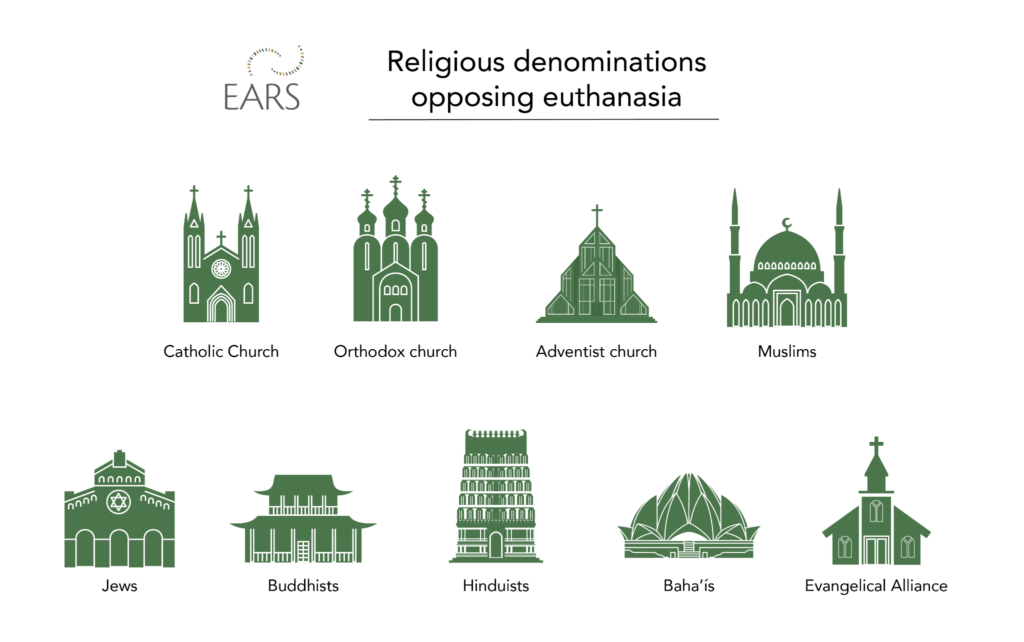Building bridges between different bubbles on euthanasia
Building bridges between different bubbles on euthanasia
Euthanasia was recently legalised in Portugal. However, this process was not without opposition. This highlights the tension between two bubbles: the political and the religious.
This article is part of our series on normativity in Europe.
The legalisation of euthanasia in Portugal took place in 2020, and was confirmed in 2021. This process was not without opposition. The legalisation of euthanasia has always been a long-term aspiration of various left-wing actors. However, this move consistently faced opposition from the Catholic Church, which has been joined by other faiths in an unprecedented inter-religious alliance. Therefore, the issue of euthanasia in Portugal highlights the tension between two different bubbles: the political and the religious.
30 years of parliamentary discussion
The recent approval of the Portuguese law to decriminalise euthanasia (also referred to as medically-assisted death) emerges almost a year after its approval. This was the result of a long and not always peaceful discussion between various parts of society, including the different religious denominations.
The discussion began in 1995 with an opinion by the National Ethics Council for Life Sciences (CNECV), which considered that “the acceptance of euthanasia by civil society and the law would lead to a loss of confidence that the patient has in the doctor and in health teams.”[1]
From the parliamentary discussion to the approval of the law
After more than twenty years of debates, discussions, and drafts to regulate medically-assisted death, a proposal for its liberalisation finally emerged in the Portuguese parliament. It experienced both support and strong opposition.[2] On May 29, 2018, different proposals presented by various parties were voted down by a short margin.[3] Future proposals would not be heard in the parliament during the tenure of the same legislature (2015 to 2019).[4]
On February 20, 2020, new proposals were brought to a vote in the parliament from the same parties that had already done so in 2018, alongside the Liberal Initiative. Unlike the previous vote, the decriminalisation of medically-assisted death was approved in general terms.[5] Portugal became the fourth country in Europe to approve euthanasia, after the Netherlands, Belgium, and Luxembourg.[6]
Presidential veto
Soon after the law was approved, the President of the Republic, Marcelo Rebelo de Sousa, sent it to the Constitutional Court to assess whether it complied with Portuguese constitutional requirements.[7] On March 15, 2021, the same court issued advice considering that the law included concepts that were not properly determined, such as ‘intolerable suffering’ and ‘permanent injury’. However, the court considered that decriminalisation of medically-assisted death itself was legitimate and constitutional.[8] Following the court’s decision, the President vetoed the law on the grounds of unconstitutionality. The law was sent back to the parliament for reconsideration.[9]
The position of religious denominations
Various religions in Portugal, starting with the Catholic Church – the most representative religious denomination in terms of number of believers in the country – have always opposed euthanasia (and assisted suicide). On the eve of the 2018 vote, nine religious denominations – Catholic, Orthodox and Adventist Churches, Islamic, Jewish, Buddhist, Hindu and Bahá’í communities, and the Evangelical Alliance – spoke out for the “inviolability of human life until natural death” and expressed “opposition to the legalisation” of “assisted suicide and euthanasia.”[10] In 2020, the same representatives again expressed their opposition to the bill to legalise medically-assisted death.[11] One of the key arguments these religious communities made was that Portugal did not offer sufficient medical care for serious illness to justify the use of euthanasia.[12]

The referendum issue
However, during the 2020 Portuguese Episcopal Conference, the Catholic Church announced its support for a possible referendum, contrary to what it had advocated for until then. The Church explained that although “life-related issues were not referendable,” it would be more legitimate to listen to the popular will than to leave the issue to two hundred representatives.[13] The support for a referendum, however, was not shared by all the representatives of the other religious communities. For this reason, the Interfaith Working Group (composed of the religious denominations mentioned above) did not take any position in that direction.[14]
The position of civic movements
The Portuguese Federation for Life (Federação Portuguesa pela Vida), a group of associations that defend life until natural death, began collecting signatures in favour of the referendum. Meanwhile, the civic movement Direito a Morrer com Dignidade (Right to Die with Dignity), which promotes the legalisation of medically-assisted death, was against this solution.[15]
In the case of the first movement, there is a prevalence of associations that, although secular, are inspired by the Catholic Church. In the case of the second movement, its composition includes mainly individual personalities associated with parties more on the political left and the arts.[16] Among the left-wing parties, the Portuguese Communist Party’s opposition to both legalisation and the referendum stands out.[17] This is particularly important since the Communist Party is the only party supporting the governing majority that has taken a position contrary to that of the government regarding euthanasia.[18]
Among the bubble of physicians, there seems to be an intricate division of opinions. The Medical Association Board has taken an active position against legalisation,[19] while other doctors explicitly defend it.[20] Apart from the positions of the movements, the CNEVC has once again pronounced itself against the legalisation of medically-assisted death.[21]
A law that is burning bridges
The recent approval of the law decriminalising euthanasia in Portugal did not make the debate in Portuguese society disappear. On the contrary, the lack of a referendum to hear the opinion of the whole population, irrespective of political ideology or religious denomination of each citizen, has contributed to this situation. Although approved by law, euthanasia continues to be a hot topic of discussion for religious, social, and political reasons, which instead of building bridges between different groups has isolated them even more. The groups seem to remain unyielding in their opinion as individuals and as citizens.
Our team of analysts conducts research on topics relating to religion and society. In the second half of 2021, we are focusing on the subject of normativity. Find out more on the EARS Dashboard.
Sources
[1] Conselho Nacional de Ética para as Ciências da Vida, “Parecer de 18 de fevereiro de 2020”, CNECV.
[2] “Manifestação pelo “não” à eutanásia nas escadarias do Palácio de São Bento”, RTP, 29 de Maio de 2018.
[3] “Eutanásia chumbada. Nova votação só depois das eleições”, Diário de Notícias, 29 de maio de 2018.
[4] XIII Legislatura da Terceira República Portuguesa.
[5] “Parlamento aprovou eutanánia por mais de 40 votos, PS bloqueia referendo”, Expresso, 20 de fevereiro de 2020.
[6] “Em que países a eutanásia não é considerada crime?”, RTP, 20 de fevereiro de 2020.
[7] “A fiscalização para travar a eutanásia”, Jornal I, 20 de fevereiro de 2021.
[8] “Eutanásia. TC chumba, mas autores da lei voltarão à carga no Parlamento”, Diário de Notícias, 16 de março de 2021.
[9] “Marcelo vetou eutanásia por inconstitucionalidade”, Jornal de Negócios, 15 de março de 2021.
[10] “Eutanásia: Religiões unidas pelo “não”, católicos distribuem 1,5 milhões de panfletos”, Revista Sábado, 28 de maio de 2018.
[11] “Nove religiões apelam a Marcelo contra “equívocos e ambiguidades” da eutanásia”,
Expresso, 12 de fevereiro de 2020.
[12] “O que disseram médicos, políticos e a Igreja sobre a eutanásia?”, Rádio TSF, 19 de fevereiro de 2020.
[13] “Igreja Católica anuncia apoio a referendo à eutanásia”, Observador, 11 de fevereiro de 2020.
[14] “Eutanásia: Grupo de Trabalho Inter-Religioso não toma posição sobre referendo”,
Diário de Notícias, 12 de fevereiro de 2020.
[15] “Eutanásia. Recolha de assinaturas para o referendo está «viral», movimento a favor da despenalização diz que consulta é «antidemocrática»”, Expresso, 12 de fevereiro de 2020.
[16] “Direito a Morrer com Dignidade”, Wikipedia.
[17] “«Não matem»”, pede Jerónimo. PCP contra referendo e eutanásia”, Público, 13 de fevereiro de 2020.
[18] “Sobre a provocação da morte antecipada – «eutanásia» e «suicídio assistido»”, Intervenção de António Filipe Na Assembleia da República, 20 de fevereiro de 2020.
[19] “«Não matem»”, pede Jerónimo. PCP contra referendo e eutanásia”, Público, 13 de fevereiro de 2020.
[20] “O que dizem os médicos a favor da despenalização da eutanásia”, Visão, 18 de fevereiro de 2020.
[21] “As 9 razões do Conselho de Ética para chumbar os projetos da eutanásia”, Observador, 18 de fevereiro de 2020.






